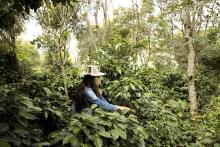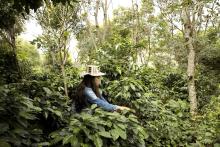But none of this is accidental. They are achievements directly supported by gender statistics—including disaggregated and localized data on violence against women (VAW).
The rapid gender assessment on violence against women (VAW) during COVID-19, rolled out nationally by UN Women in 2021, found that 63 per cent of surveyed women said they or someone they know had experienced at least one form of VAW—almost double the 33 per cent estimated in a national demographic and health survey in 2016. In addition, the rapid survey found that 20 per cent of women thought domestic conflicts had increased during the pandemic; 36 per cent believed it was common for women to be harassed in public; and 43 per cent said domestic abuse had become more common since the pandemic.
These and other data from the rapid survey were released through a series of activities in November 2021, attended by Isabel Goyes, Co-director of the Nariño Gender Observatory.
“Clearly these reports were very important benchmarks. We commented in that meeting in Bogotá that these figures were useful, but that for the regions we needed disaggregated data,” explains Goyes. “We give regional context to national figures, and after that event, they gave us access to the disaggregated microdata, which gave us data specific to Nariño and enabled us to prepare an analysis.”
The Observatory prepared the localized report for the Department of Nariño and the Municipality of Pasto, whose findings were disseminated through radio and television programmes, at an event and shared directly with relevant institutions, authorities and entities.
Elena Pantoja, Secretary of Women, Sexual Orientations and Gender Identities for the Municipality of Pasto, was among them: “These figures allowed us to make our mayor understand the importance of the issue and include things in the Municipal Development Plan to obtain unassigned resources. This allowed us to access historic resources and develop an economic autonomy project with a real gender perspective, because it was understood that these levels of violence in households made it necessary to support economic autonomy to enable women to escape cycles of violence.”
According to Pantoja, under this 2022 project, 147 women have already benefited directly from individual and collective entrepreneurial ventures, while another 435 people (from their families) will benefit indirectly. In addition, the project is strengthening some 10 to 15 civil society organizations.
“With these figures, we gave visibility to the problems of our territory and managed to attract resources to attend to victims at family police stations, through Spanish cooperation,” explains Pantoja, adding that this has included a diploma and technological help for the Metropolitan Police, such that the closest quadrant can now reach a woman experiencing violence in less than 3 minutes. “They have helped us open doors, raise awareness and improve inter-institutional coordination with those who must guarantee care and protection.”
Pantoja asserts that having localized VAW data also helped increase related budget allocations. In fact, the budget allocated to gender issues in the Municipal Development Plan has tripled—from 400 million Colombian pesos (USD 83,000) a year before the pandemic, to 1.2 billion pesos (USD 250,000) in 2021.
“These surveys have allowed government councils, secretariats and decentralized entities to get onboard,” says Pantoja. “Many actions have been achieved. And there is an appreciation, because these figures are helping make the Gender Mechanism fundamental. […] These figures allow us to raise awareness from within, institutionally, so that resources aren’t simply assigned to meet goals or indicators but allocated in such a way that we put ourselves in the shoes of those who need these strategic actions.”
The Observatory also successfully used the VAW data to lobby the University of Nariño to reopen the Support Unit for Women Victims of Violence (UNAVI), which closed during the pandemic due to administrative issues. It reopened in May 2022, offering legal clinics and psychological support for an average of 20 survivors per month.
“Statistics have provided a lot of support, not only with the reopening of UNAVI as such, but they reveal a series of aggressions that occur in the public and private sphere that many women do not report,” indicates Henry Rosero, founder and advising professor of the UNAVI.
Rosero recounts that a few weeks ago a survivor of domestic violence who had to leave her home with her children during the pandemic finally managed to return home—and for her aggressor to leave—with the legal support of UNAVI.
Rolando Crespo, Coordinator of UN Women Colombia’s Women Count Project, highlights the importance of VAW data to bringing about necessary changes: “Timely evidence has the capacity to promote the social, economic and political transformations that are required for substantive equality between women and men.”

